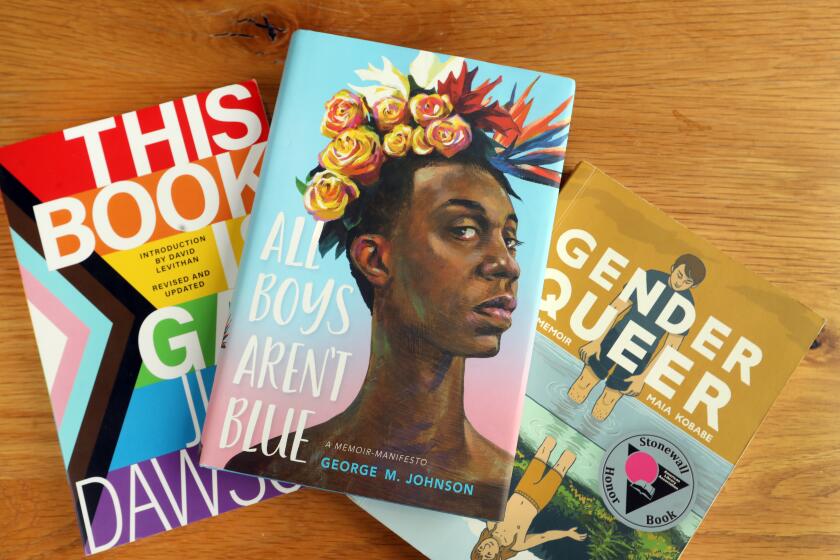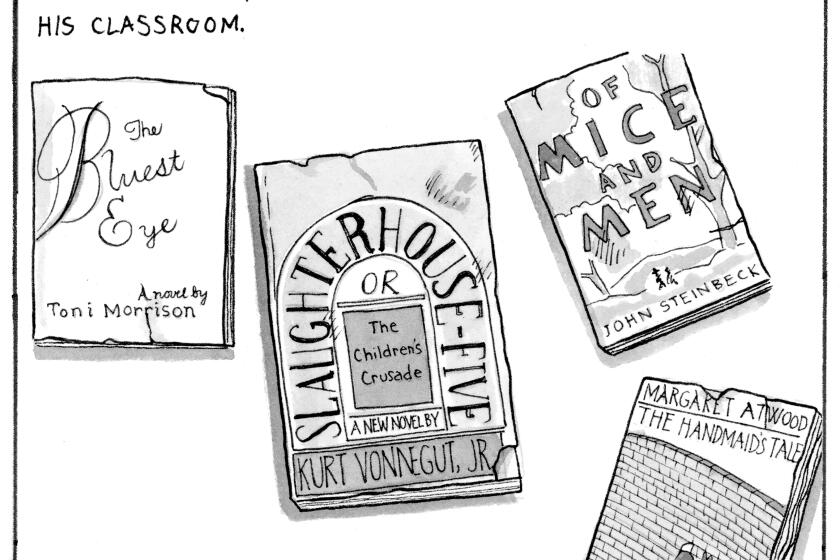Opinion: Why I wish my novels were banned

- Share via
When PEN America emailed me, I was excited. The organization, whose mission is to protect the freedom to write, was looking for volunteers to code banned books. The goal was clear: Identify what types of information and representation are being targeted by censors. Armed with that knowledge, PEN can send advocates for free expression and diversity to talk to parent groups, school boards and city councils, to fight to keep books on school and library shelves.
I’m a writer. I believe no book should be banned. There are plenty I wouldn’t recommend but rarely because of the content.
Not every book is right for all ages, but that is no excuse to keep readers away from good books and good authors, not to mention classic works and great authors. The purpose of reading is to open us to new things, to meet characters we would never know otherwise, to discover cultures and whole worlds we cannot imagine. Sometimes that’s disturbing, intense or difficult. Sometimes it makes you think. Thinking is a good thing.
The new memoir ‘That Librarian’ by Amanda Jones is a troubling portrait of America’s culture war over censorship and book banning
I signed up for PEN’s coding project. In our training session it broke my heart to discover how many book bans have been documented. In 2023, a new record was set: 4,349 bans from July through December, across 23 states and 52 public school districts, more bannings than PEN documented in all of the 2022-23 school year. The list of titles and authors goes on for pages and pages. Some will get rescued in one school district, only to get targeted all over again in another.
My task was to fill out a lengthy questionnaire for each of the 30 books I was assigned. Scanning the text and reading secondary sources, I tracked whether the book was fiction or nonfiction, the intended grade or age level, and the setting and genre. Next I looked at whether it had LGBTQ+, BIPOC, disabled or neurodivergent characters — as protagonists or supporting characters — and if it explored themes or metaphors related to those identities. Was race an issue in the book; did it depict racism? Was it about social activism, immigration or incarceration?
I answered questions meant to measure the violence in books, how sexuality and sexual behavior were portrayed, whether the sex was consensual or not, and if religion, self-esteem or self-empowerment were central to the plot.
You know where this is going. Books with a queer character, even just a bit player, who questions their gender seem to land on the banned lists.
The right-wing hysteria over books with sexual, violent or racial themes is ridiculous. Not that the left, even in California, is entirely innocent
In Florida, some versions of “The Diary of Anne Frank,” including a graphic-novel adaptation, were banned or challenged because they didn’t edit out passages in which Anne writes about experiments with kissing a girl and her own explorations of her pubescent body. A lot of the time, it’s sex, however anodyne, that sets off book banners.
Censors consistently challenge the award-winning and bestselling YA title “The Hate U Give,” which features a white police officer wrongly shooting a young Black man, as anti-police and racist against whites. Should the young witness have stayed silent? Should her parents have praised the cop?
One book on my list made absolutely no sense to me: “A Separate Peace” by John Knowles. It is a classic, beautiful story set during World War II about friendship and loss and patriotism. It has been challenged time and again. In 1980, the Vernon-Verona-Sherrill school district in New York called it a “filthy, trashy, sex novel.” There is no sex in it. It has been challenged for its language (less vulgar than anything heard on TV these days) and the negative attitude of the teenagers(!!), and because the friendship between Gene and Finny, the main characters, has homosexual overtones. You can read it that way, but it’s on you, because the author was adamant that his characters aren’t gay.
Maybe you too feel ‘unstuck in time’ like a Vonnegut character. If you went to school somewhere where Vonnegut wasn’t banned.
“Charlotte’s Web” has been banned, deemed sacrilegious because a spider is smarter than humans. And these classics for slightly older readers also are among the often banished or challenged: “The Kite Runner,” for depicting homosexuality and promoting Islam; “Bless Me, Ultima,” for profanity, sex and “anti-Catholic” ideas; “Heart of Darkness,” for racism; and “Brave New World,” for just about everything: “the book’s language and moral content.”
I read my granddaughter one of the most banned picture books of all time, “And Tango Makes Three,” the true story of two male penguins at the Central Park Zoo who hatched an abandoned egg and together raised the new chick. No matter how many times I read it to her, it won’t make her gay any more than it will turn her into a penguin. It might lead her to a factual and hardly incendiary idea: There are all kinds of families.
All the best writers, from Chaucer to Shakespeare, George Orwell to J.R.R. Tolkien, Harper Lee to Toni Morrison, have been banned. As Angie Thomas, author of “The Hate U Give,” said, “It is an honor to be banned because every single book that is on that list has changed perspectives, … changed lives.”
After I finished coding the books on PEN’s list, my main thought wasn’t pretty: envy. My novels aren’t well enough known to be banned — not even “Spontaneous,” about spontaneous human combustion, happily incestuous sisters and sex with a little person. I deserve to be banned. I live in hope of getting enough readership to rate banishment. I would be proud to be on the book banners’ Enemies List.
Diana Wagman, a contributing writer to Opinion, is the author of six novels.
More to Read
A cure for the common opinion
Get thought-provoking perspectives with our weekly newsletter.
You may occasionally receive promotional content from the Los Angeles Times.












